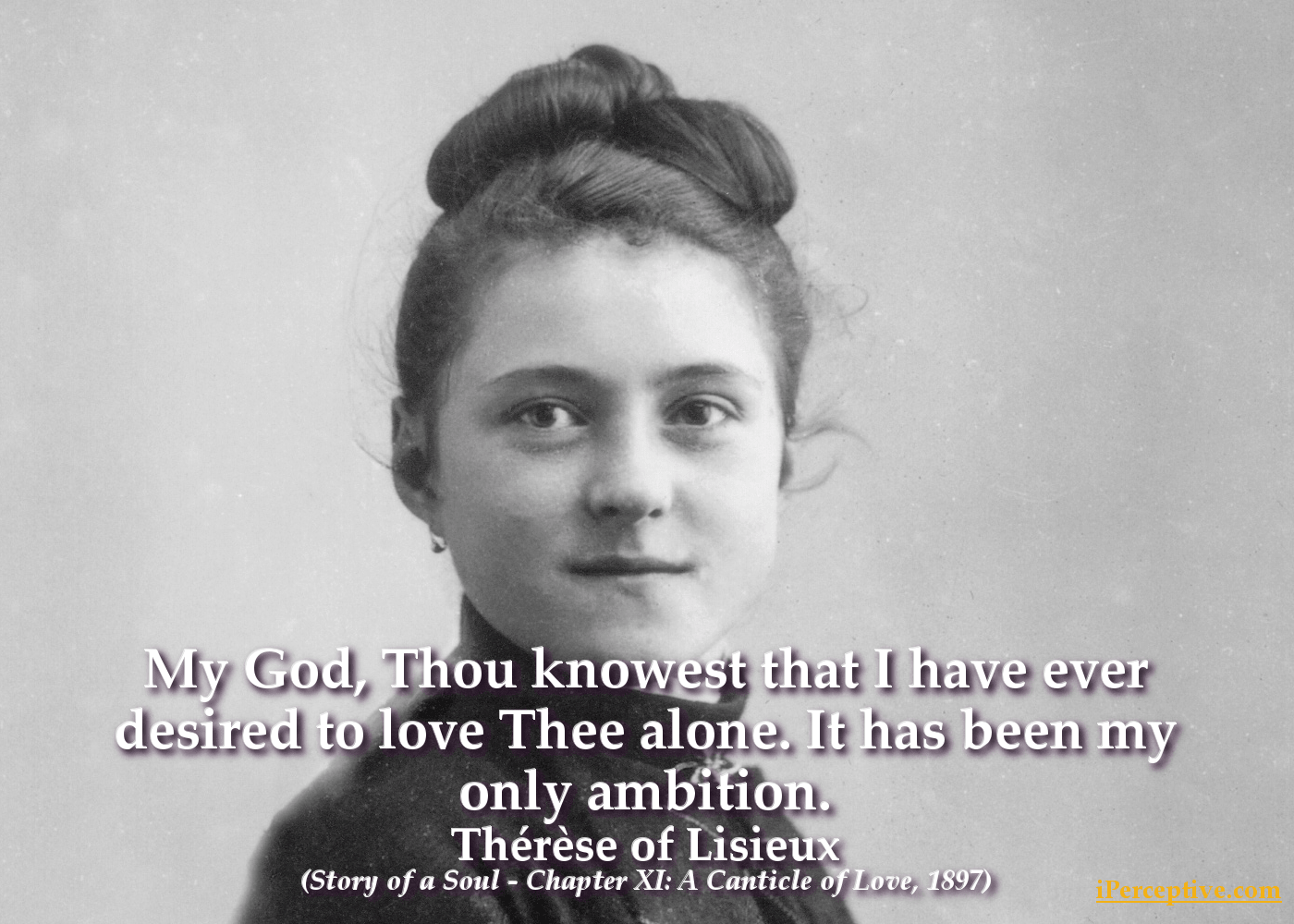Thérèse of Lisieux Quotes
Since the age of three I have refused God nothing.
Each grace faithfully received brought many others.
It is so easy to go astray in the seductive paths of the world.
O Jesus, my Love, at last I have found my vocation. My vocation is love!

I understood that true greatness is not found in a name but in the soul.
All those beloved by God have followed the inspiration of the Holy Ghost.
I had one other great wish; it was to love God only, and to find my joy in Him alone.

My God, Thou knowest that I have ever desired to love Thee alone. It has been my only ambition.
All that I have set down in these few words would take many pages to relate; but those pages will never be read on earth...
I understood that without love even the most brilliant deeds count for nothing. These gifts, which Our Lord lavished upon me, far from doing me any harm, drew me towards Him; I saw that He alone is unchangeable, He alone can fill the vast abyss of my desires.
I find that trials help very much in detaching us from this earth. They make us look higher than this world. Here below, nothing can satisfy us. We cannot enjoy a little rest except in being ready to do God's will.
When a gardener gives special attention to a fruit which he wishes to ripen early, he does so, not with a view to leaving it on the tree, but in order to place it on a well-spread table. Our Lord lavished His favours on His Little Flower in the same way.
For me, prayer is an aspiration of the heart, it is a simple glance directed to heaven, it is a cry of gratitude and love in the midst of trial as well as joy; finally, it is something great, supernatural, which expands my soul and unites me to Jesus.
In spite of everything, I feel that I am filled with courage; I am sure that God is not going to abandon me. Oh. I want to refuse Him (Jesus) nothing, and even though I feel sad and alone on this earth, He still remains with me. And has not St. Teresa said: God alone suffices. "
For as long a time as Thou willest I shall remain—my eyes fixed upon Thee. I long to be allured by Thy Divine Eyes; I would become Love's prey. I have the hope that Thou wilt one day swoop down upon me, and, bearing me away to the Source of all Love, Thou wilt plunge me at last into that glowing abyss, that I may become for ever its happy Victim.
My happy disposition completely changed after Mamma's death. I, once so full of life, became timid and retiring, sensitive to an excessive degree. One look was enough to reduce me to tears, and the only way I was content was to be left completely alone. I could not bear the company of strangers and found my joy only within the intimacy of the family.
I thank Our Lord that He let me find nothing but bitterness in human affections. I should have been caught easily, and had my wings clipped...Our Lord knew that I was far too weak to face temptation; He knew that I would certainly have burnt myself in the bewildering light of earthly things, and so He did not let it shine in my eyes. Where stronger souls find joy but remain detached because they are faithful, I found only misery.
I attach no importance to my dreams, and indeed, they seldom have any special meaning, though I do often wonder how it is that, as I think of God all the day, my mind does not dwell on Him more in my sleep. Generally I dream of the woods and the flowers, the brooks and the sea, and nearly always of pretty children; or I chase birds and butterflies such as I have never seen. But, if my dreams are sometimes poetical, they are never mystical.
How many souls might attain to great sanctity if only they were directed aright from the first! I know God has not need of anyone to help Him in His work of sanctification, but as He allows a clever gardener to cultivate rare and delicate plants, giving him the skill to accomplish it, while reserving to Himself the right of making them grow, so does He wish to be helped in the cultivation of souls. What would happen if an ignorant gardener did not graft his trees in the right way? if he did not understand the nature of each, and wished, for instance, to make roses grow on peach trees?
It seems to me that if a little flower could speak, it would tell simply what God has done for it without trying to hide its blessings. It would not say, under the pretext of a false humility, it is not beautiful and without perfume, that the sun has taken away its splendor and the storm has broken its stem when it knows that all this is untrue. The flower about to tell her story rejoices at having to publish the totally gratuitous gifts of Jesus. She knows that nothing in herself was capable of attracting the divine glances, and His mercy alone brought about everything that is good in her.
But how shall I show my love, since love proves itself by deeds? Well! The little child will strew flowers . . . she will embrace the Divine Throne with their fragrance, she will sing Love's Canticle in silvery tones. Yes, my Beloved, it is thus my short life shall be spent in Thy sight. The only way I have of proving my love is to strew flowers before Thee—that is to say, I will let no tiny sacrifice pass, no look, no word. I wish to profit by the smallest actions, and to do them for Love. I wish to suffer for Love's sake, and for Love's sake even to rejoice: thus shall I strew flowers. Not one shall I find without scattering its petals before Thee . . . and I will sing . . . I will sing always, even if my roses must be gathered from amidst thorns; and the longer and sharper the thorns, the sweeter shall be my song.
But I would not and I could not tell you all. Some things lose their fragrance when exposed to the air, and so, too, one's inmost thoughts cannot be translated into earthly words without instantly losing their deep and heavenly meaning. How sweet was the first embrace of Jesus! It was indeed an embrace of love. I felt that I was loved, and I said: "I love Thee, and I give myself to Thee for ever." Jesus asked nothing of me, and claimed no sacrifice; for a long time He and little Thérèse had known and understood one another. That day our meeting was more than simple recognition, it was perfect union. We were no longer two. Thérèse had disappeared like a drop of water lost in the immensity of the ocean; Jesus alone remained—He was the Master, the King! Had not Thérèse asked Him to take away her liberty which frightened her? She felt herself so weak and frail, that she wished to be for ever united to the Divine Strength.
My God, Thou knowest that I have ever desired to love Thee alone. It has been my only ambition. Thy love has gone before me, even from the days of my childhood. It has grown with my growth, and now it is an abyss whose depths I cannot fathom.
Love attracts love; mine darts towards Thee, and would fain make the abyss brim over, but alas! it is not even as a dewdrop in the ocean. To love Thee as Thou lovest me, I must make Thy Love mine own. Thus alone can I find rest. O my Jesus, it seems to me that Thou couldst not have overwhelmed a soul with more love than Thou hast poured out on mine, and that is why I dare ask Thee to love those Thou hast given me, even as Thou lovest me.
If, in Heaven, I find that thou lovest them more than Thou lovest me, I shall rejoice, for I acknowledge that their deserts are greater than mine, but now, I can conceive no love more vast than that with which Thou hast favoured me, without any merit on my part.
....
Dear Mother, what I have just written amazes me. I had no intention of writing it.

